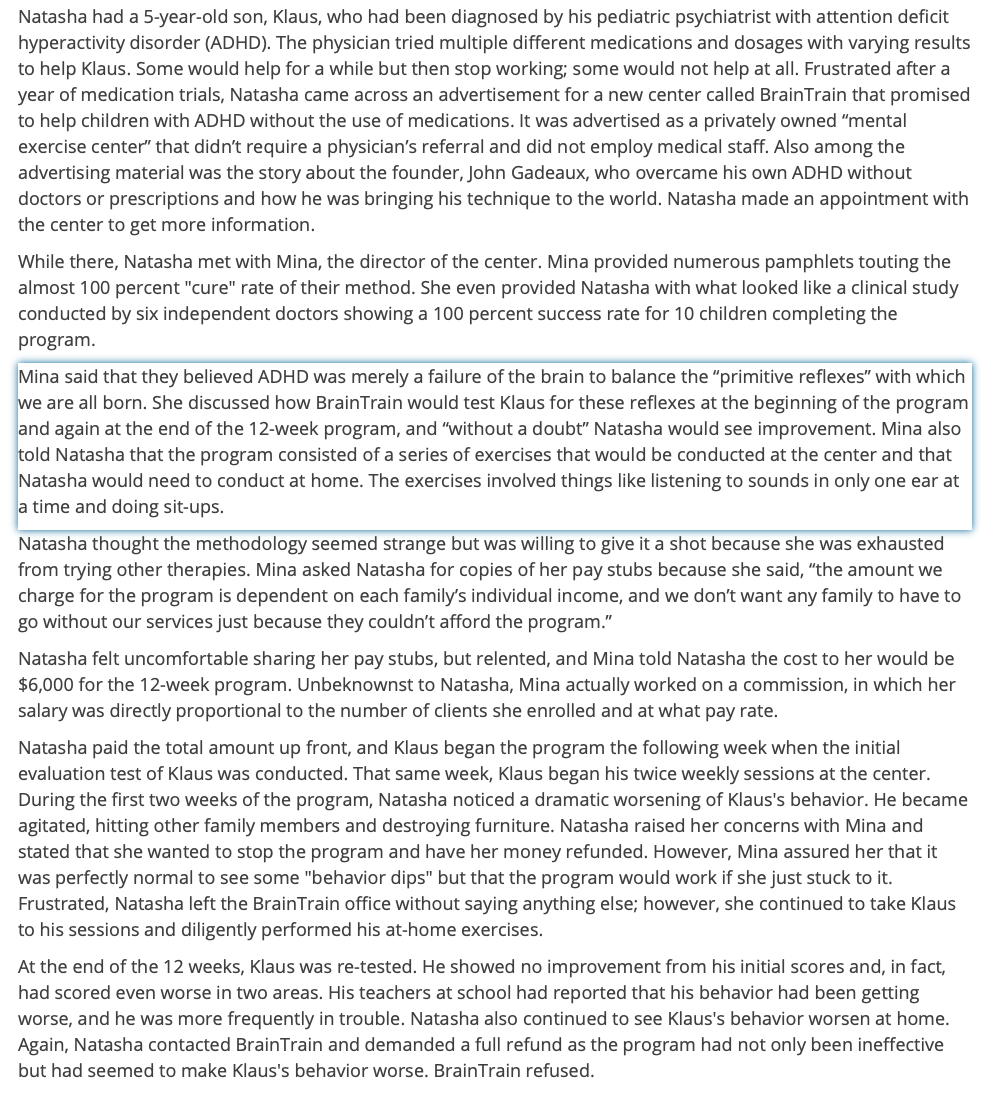ad executed a written contract which contained a liquidated damages clause for $200 in the event that BrainTrain breached,
ad executed a written contract which contained a liquidated damages clause for $200 in the event that BrainTrain breached,
Chapter11: Planning For Health Care Expenses
Section: Chapter Questions
Problem 2FPC
Related questions
Question
If BrainTrain and Natasha had executed a written contract which contained a liquidated damages clause for $200 in the event that BrainTrain breached, and assuming BrainTrain admits to a breach, would that clause be upheld in court?
Select Correct Answer
a) Yes, it is reasonable and fair.
b) No, in this case, actual damages can be easily determined.
c) No, the amount is too low for the type of harm she suffered.

Transcribed Image Text:Natasha had a 5-year-old son, Klaus, who had been diagnosed by his pediatric psychiatrist with attention deficit
hyperactivity disorder (ADHD). The physician tried multiple different medications and dosages with varying results
to help Klaus. Some would help for a while but then stop working; some would not help at all. Frustrated after a
year of medication trials, Natasha came across an advertisement for a new center called BrainTrain that promised
to help children with ADHD without the use of medications. It was advertised as a privately owned "mental
exercise center" that didn't require a physician's referral and did not employ medical staff. Also among the
advertising material was the story about the founder, John Gadeaux, who overcame his own ADHD without
doctors or prescriptions and how he was bringing his technique to the world. Natasha made an appointment with
the center to get more information.
While there, Natasha met with Mina, the director of the center. Mina provided numerous pamphlets touting the
almost 100 percent "cure" rate of their method. She even provided Natasha with what looked like a clinical study
conducted by six independent doctors showing a 100 percent success rate for 10 children completing the
program.
Mina said that they believed ADHD was merely a failure of the brain to balance the "primitive reflexes" with which
we are all born. She discussed how BrainTrain would test Klaus for these reflexes at the beginning of the program
and again at the end of the 12-week program, and "without a doubt" Natasha would see improvement. Mina also
told Natasha that the program consisted of a series of exercises that would be conducted at the center and that
Natasha would need to conduct at home. The exercises involved things like listening to sounds in only one ear at
a time and doing sit-ups.
Natasha thought the methodology seemed strange but was willing to give it a shot because she was exhausted
from trying other therapies. Mina asked Natasha for copies of her pay stubs because she said, "the amount we
charge for the program is dependent on each family's individual income, and we don't want any family to have to
go without our services just because they couldn't afford the program."
Natasha felt uncomfortable sharing her pay stubs, but relented, and Mina told Natasha the cost to her would be
$6,000 for the 12-week program. Unbeknownst to Natasha, Mina actually worked on a commission, in which her
salary was directly proportional to the number of clients she enrolled and at what pay rate.
Natasha paid the total amount up front, and Klaus began the program the following week when the initial
evaluation test of Klaus was conducted. That same week, Klaus began his twice weekly sessions at the center.
During the first two weeks of the program, Natasha noticed a dramatic worsening of Klaus's behavior. He became
agitated, hitting other family members and destroying furniture. Natasha raised her concerns with Mina and
stated that she wanted to stop the program and have her money refunded. However, Mina assured her that it
was perfectly normal to see some "behavior dips" but that the program would work if she just stuck to it.
Frustrated, Natasha left the BrainTrain office without saying anything else; however, she continued to take Klaus
to his sessions and diligently performed his at-home exercises.
At the end of the 12 weeks, Klaus was re-tested. He showed no improvement from his initial scores and, in fact,
had scored even worse in two areas. His teachers at school had reported that his behavior had been getting
worse, and he was more frequently in trouble. Natasha also continued to see Klaus's behavior worsen at home.
Again, Natasha contacted BrainTrain and demanded a full refund as the program had not only been ineffective
but had seemed to make Klaus's behavior worse. BrainTrain refused.
Expert Solution
This question has been solved!
Explore an expertly crafted, step-by-step solution for a thorough understanding of key concepts.
This is a popular solution!
Trending now
This is a popular solution!
Step by step
Solved in 2 steps

Knowledge Booster
Learn more about
Need a deep-dive on the concept behind this application? Look no further. Learn more about this topic, accounting and related others by exploring similar questions and additional content below.Recommended textbooks for you








Individual Income Taxes
Accounting
ISBN:
9780357109731
Author:
Hoffman
Publisher:
CENGAGE LEARNING - CONSIGNMENT
